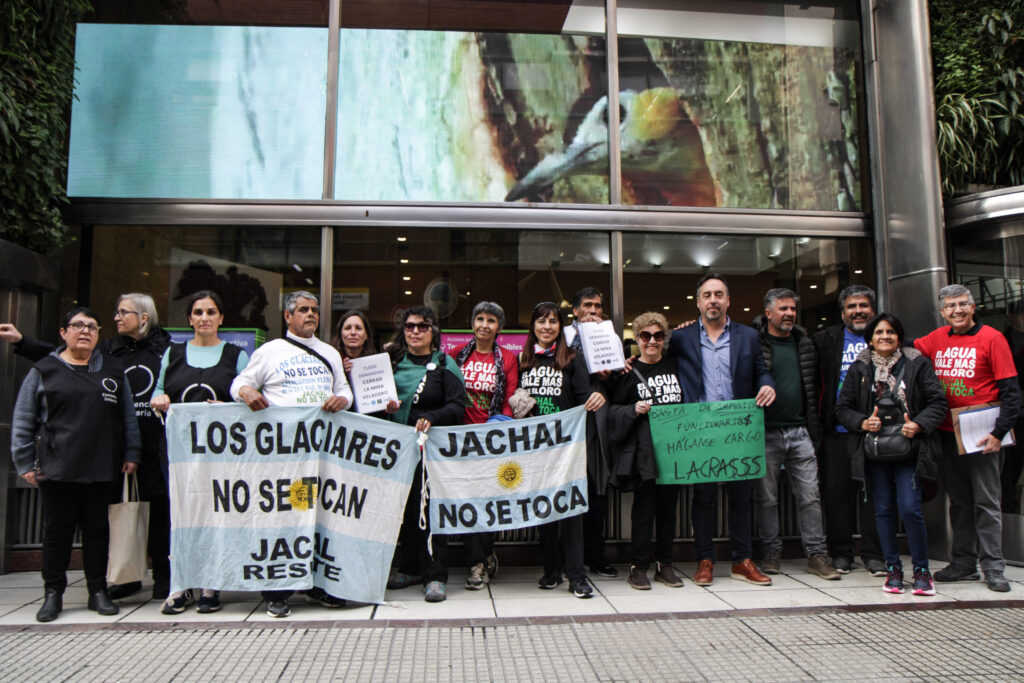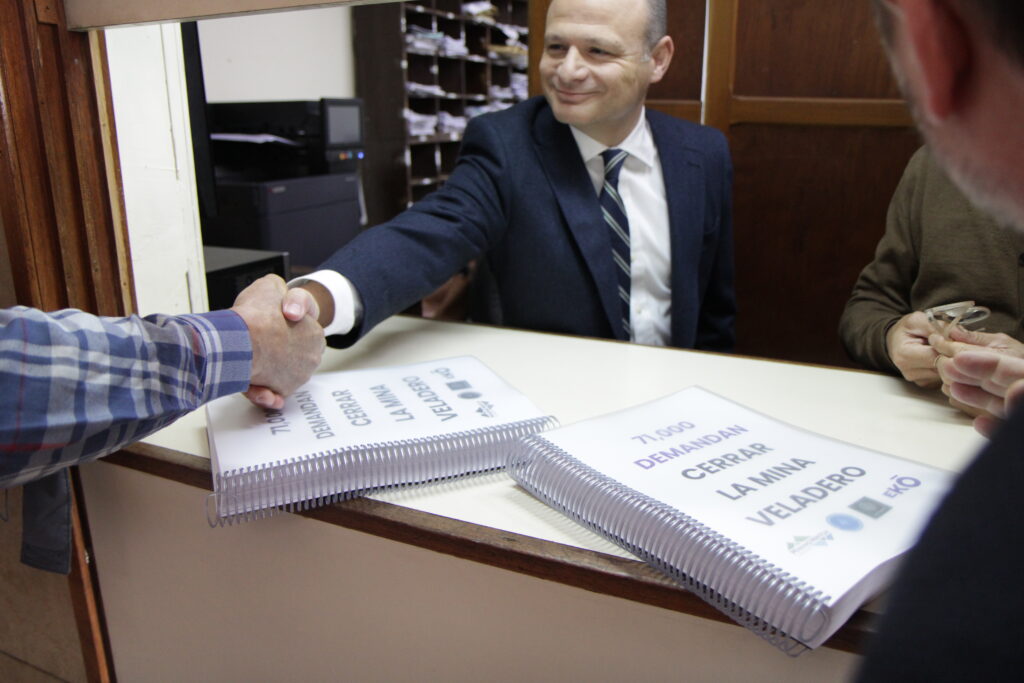Media Contact:
Lacey Kohlmoos, Ekō, Lacey@eko.org, +1 (703) 258-5599
Jan Morrill, Earthworks, jmorrill@earthworksaction.org, +1 (207) 542-4360
Viviana Herrera, MiningWatch Canada, viviana@miningwatch.ca, +1 (438) 993-1264
On July 31, the Assembly of Jáchal No Se Toca and its allies gathered outside a Federal Court and the Ministry of the Environment in Buenos Aires, Argentina, to demand the advancement of a trial for a 2015 spill that has been called “the worst environmental disaster caused by mining in Argentina’s history.”
Members of the Assembly of Jáchal No Se Toca traveled from the province of San Juan to deliver an accompanying petition signed by 71,000 people demanding the permanent closure of the Veladero gold mine, owned by the Canadian company Barrick Gold through a joint venture with the Chinese company Shandong Gold.
“Eight years have passed since the most serious incident in the history of mining in Argentina, and still no trial,” says Domingo Jofré of the Assembly Jáchal No Se Toca. “We demand that it takes place, and that there be justice for the communities of Jáchal.”

The petition was organized by Ekō, a global consumer watchdog group that holds multinational corporations accountable. “As evidenced by the number of signatures on the petition, people all over the world are watching to see if Argentinian government officials will protect their people from Barrick Gold’s toxic mine,” says Lacey Kohlmoos, Senior Water Campaign Manager at Ekō. “And if the government continues to ignore the demands of communities suffering from dangerous levels of cyanide and mercury in their water, if they refuse to close down the Veladero Mine, then they will face a wave of global outrage and condemnation.”
On September 12, 2015, a spill caused by a valve failure in a leaching pad pipeline released millions of liters of water contaminated with cyanide, mercury, and heavy metals into local watersheds, polluting at least five rivers. While the Canadian company and the provincial government remained silent and later tried to conceal the spill, the community of Jáchal learned about the disaster from a Veladero mine employee via WhatsApp. This led the affected communities to quickly mobilize to bring attention to what had happened, demand explanations, and seek remedy.
Within a few days, environmental lawyers representing the Assembly of Jáchal No Se Toca initiated legal proceedings with the Federal Court of Buenos Aires – attempting to put on trial the Secretaries of Environment and Mining for having violated the law protecting glaciers by permitting Barrick Gold to mine in prohibited areas. They hope that through a trial, Barrick’s license to operate will be revoked and the mine will be closed. To date, arbitrary delays and judicial stall tactics have so far prevented the case from advancing to trial.
Since the 2015 spill, residents of Jáchal have faced four other toxic spills from the mine. While official complaints were filed regarding these other spills, they were either archived or dismissed without due process or any investigation by the authorities. The only open case remaining in the courts is related to the 2015 spill.

“The involvement of the Assembly Jáchal No Se Toca in the case in Buenos Aires marks the only opportunity that the people of Jáchal have to defend their human right to water,” said Saúl Zeballos of the Assembly Jáchal No Se Toca.
“The importance of a trial and this entire process is to expose, for the first time, the violation of environmental laws in Argentina,” says Enrique Viale, an environmental lawyer representing the Assembly of Jáchal No Se Toca. “Although the penalties may not be severe, this would mark the first time that the highest environmental authorities in Argentina would be put on trial for breaching environmental and glacier protection laws.” He added that the fact that “a grassroots assembly, like the Assembly of Jáchal, is acting as a plaintiff in this case holds significant value. This could be a turning point, making officials more cautious about disregarding environmental laws.”
“While Barrick repeatedly denies these spills, communities continue to be exposed to toxic chemicals,” says Viviana Herrera, the Latin America Program Coordinator at MiningWatch Canada. “Delays in court proceedings against government officials mean that Barrick can continue to operate with impunity. We hope this trial will be the first of many more in Argentina where Canadian companies like Barrick Gold finally face consequences for contaminating vital water sources.”
“The Argentine government must hold Barrick accountable for their pollution,” said Jan Morrill, Tailings Campaign Manager at Earthworks. “The courts in Argentina have an important role to play in ensuring clean water and health communities.”


